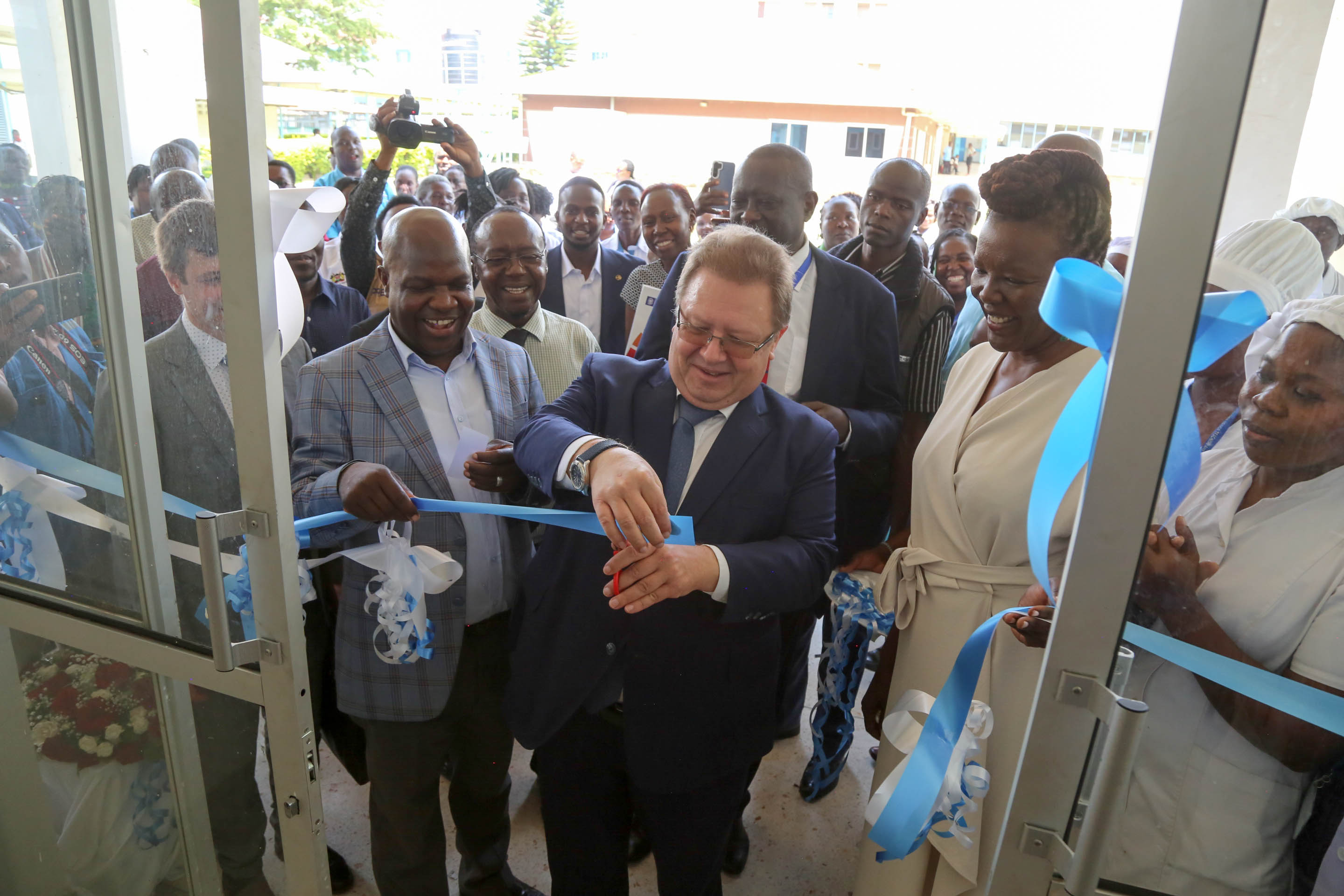
In the heart of Kisumu, the Jaramogi Oginga Odinga Teaching and Referral Hospital (JOOTRH), familiarly known as “Russia Hospital”, stands as a powerful testament to decades of international cooperation.
What began as a Soviet-era project in 1969 has now evolved into a modern medical hub, serving more than five million Kenyans.
The latest chapter in this partnership came to life on April 30 with the unveiling of a state-of-the-art kitchen designed to nourish both patients and progress.
Funded by the Russian government, this facility is designed to serve more than 1,200 patients daily, marking a significant leap forward in patient nutrition and hospital efficiency.
During the kitchen’s commissioning, Russian Ambassador Vsevolod Tkachenko committed to mobilising more financial support for improved services at the hospital.
Tkachenko said the kitchen project is a shining example of the ongoing bilateral cooperation.
"A second phase is being planned that will further improve the nutritional cafe for patients, providing specialised diets and a high-quality food processing system,” the ambassador said.
He said Russia remains committed to expanding cooperation with Kenya not only in healthcare but also in education, economic development and investment.
“I feel very much at home here, on Kenyan soil, particularly in this facility, which was originally built with assistance from my country," Tkachenko said.
“It was a long-term investment envisioned by both Russian and Kenyan partners.”
The facility is equipped with modern cookers, cold storage rooms, high-capacity dishwashers and separate preparation zones for different dietary needs, addressing both hygiene and nutrition comprehensively.
The kitchen is part of a broader Sh129 million initiative supported by the Russian government through the United Nations Development Programme, aimed at enhancing health infrastructure across three Kenyan counties.
JOOTRH also received a consignment of 89,500 vital medical supplies from Russia under the same programme.
Tkachenko emphasised the deep historical ties between Kenya and Russia, recalling that JOOTRH was originally established with support from the former USSR in 1969.
“This kitchen is a powerful symbol of continued cooperation, made possible through the joint efforts of the Russian Federation and UNDP Kenya,” he said.
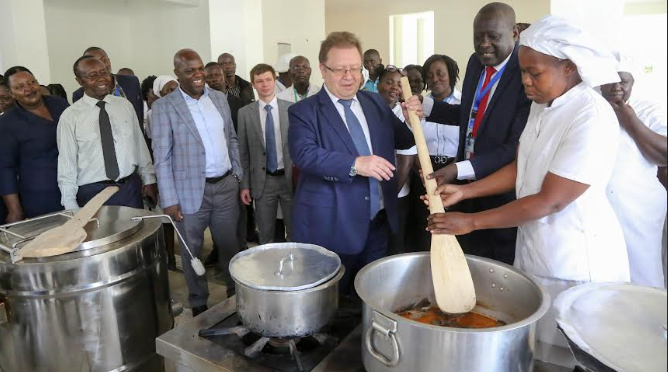
VALUE OF NUTRITION
The new facility is poised to revolutionise patient care at JOOTRH.
Its spacious and modern design incorporates specialised areas, including a main kitchen, cold storage, a dedicated diet kitchen and an in-house bakery capable of providing fresh bread daily for both patients and staff.
“Food is the first medicine,” JOOTRH CEO Dr Richard Lesiyampe said.
“This modern kitchen will significantly support the nutritional recovery of our patients, ultimately contributing to improved overall clinical outcomes.”
The transition from a traditional firewood-powered kitchen to one utilising clean energy represents a substantial environmental and health advancement.
This upgrade minimises the health risks associated with fossil fuel use and creates a safer, more hygienic working environment for kitchen staff.
Furthermore, the facility is designed to cater to a wide range of dietary needs, including the preparation of specialised meals for patients with specific medical conditions.
Kisumu Governor Anyang’ Nyong’o said this marks a major step forward in their ongoing commitment to providing the highest quality healthcare to the people of Kisumu county and the greater Western Kenya region.
"I want to express our sincere gratitude to the government of Russia and the United Nations Development Programme for their generous support in making this project a reality," he said.
He said the donors' partnership and commitment to the health and well-being of Kisumu residents is appreciated.
"We acknowledge the strong relationship between Kenya and Russia, and we are grateful for this continued collaboration," the governor said.
Nyong'o said the kitchen is not merely an infrastructure upgrade; it is a vital investment in the health and recovery of patients.
"We recognise that healthcare is not solely about treatment; it's also about creating an environment that fosters healing and well-being. And nutrition, as we all know, plays a critical role in that process," he added
The kitchen will enable JOOTRH to provide the specialised dietary support that the patients need to recover, he said.
Established in 1969 with the support of the Soviet government, JOOTRH was Russia’s flagship medical aid project in Kenya.
Originally built as the New Nyanza General Hospital, the facility became known colloquially as the “Russia Hospital” due to the substantial Soviet funding and architectural influence.
Over the years, Russia has provided technical assistance, medical equipment and training for staff.
In recent years, the relationship has been rejuvenated, with scholarships for medical professionals to study in Russian universities and construction of the modern kitchen at the facility.
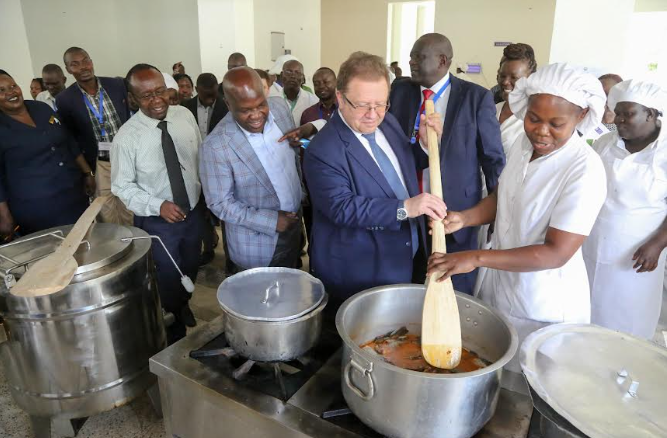
FROM REGIONAL TO NATIONAL
In March, the Cabinet approved the elevation of JOOTRH to a Level 6 national referral hospital, placing it in the same league as Kenyatta National Hospital and Moi Teaching and Referral Hospital.
This recognition reflects the hospital’s growing capacity and critical role in serving a catchment of more than five million people.
This elevation means JOOTRH will now be managed directly by the Ministry of Health, bringing increased funding, more specialists and stronger oversight.
Today, JOOTRH provides essential healthcare services to patients from Kisumu, Siaya, Homa Bay, Kakamega, Busia and beyond.
Services include specialised oncology and renal care, a neonatal ICU, dialysis and kidney treatment, surgical and trauma care.
The hospital is also a teaching hub for students from Uzima University and Maseno University, supporting Kenya’s broader health human resource goals.
JOOTRH chief executive Dr Richard Lesiyampe says their mission has always been to provide affordable, specialised care to the region’s people.
“Thanks to our partners, including the Russian Federation, we are able to scale and sustain that vision,” he said.
The modern kitchen is just one of several upgrades supported by Russia.
Amb Tkachenko revealed plans for future projects, including a potential renovation of the hospital’s laboratory and telemedicine infrastructure.
This aligns with Russia’s broader Africa health engagement strategy, which emphasises supporting social services like hospitals and schools.
“Our approach in Kenya is people-centred. We want to empower institutions that deliver real benefits: hospitals, schools and universities. JOOTRH is a shining example of this mission,” he said.
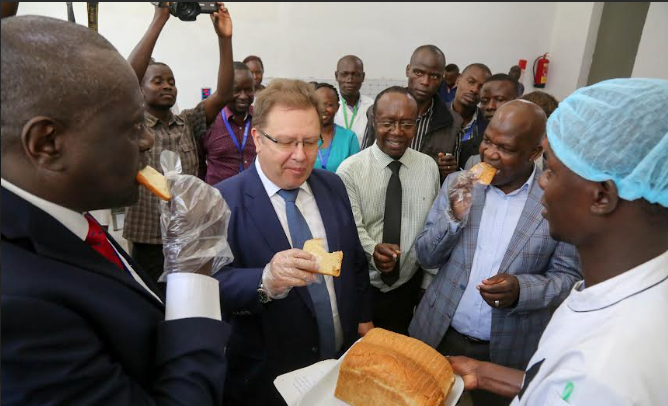
LOOKING AHEAD
For many residents of Western Kenya, JOOTRH is not just a hospital; it is a lifeline.
Patients like Mary Achieng’, a cancer survivor, praise the quality of care.
“I don’t have to go to Nairobi anymore. I got chemotherapy here, near my family. The staff are good, and now the food is even better,” she said.
The new kitchen will not only boost patient nutrition but also employee satisfaction.
Betty Okundi, director of Nutrition and Dietetic Services at JOOTRH, explained how the kitchen improves operations.
“The flow of the kitchen is excellent. We have designated areas: the main kitchen, diet kitchen, wash-up area, service area, pastry and bakery. This helps us produce safer, higher-quality food for our patients,” she said.
“When patients eat well, they recover faster. We have a cyclic menu and specialised areas to prepare meals for patients with different conditions. The diet kitchen allows for modifications according to medical needs.”
She added that cold rooms now ensure stable food supply and reduce wastage.
“With the cold rooms, our food won't spoil as quickly. It ensures constant supply and allows us to manage procurement better,” Okundi said.
“We also have a pastry area, and we’re already baking bread for our staff. We hope to generate income from this in future.”
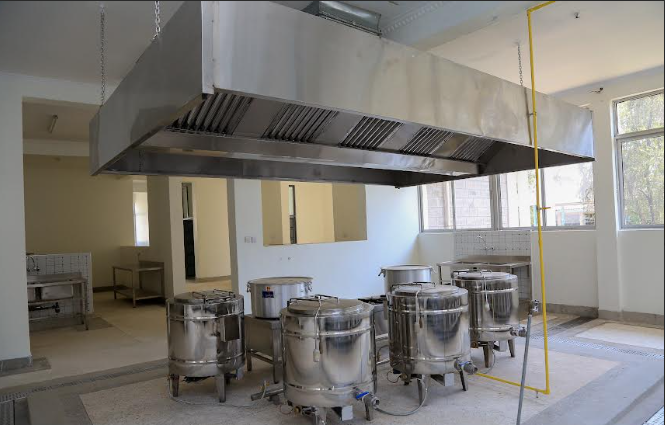
JOOTRH's transformation is being closely watched as a model for other regional referral hospitals.
The Ministry of Health and various county governments are exploring and implementing public-private-international partnerships to enhance healthcare services across the country.
From a Soviet-funded project to a flagship national referral facility, JOOTRH’s journey reflects the power of meaningful partnerships grounded in local needs.
As Russia supports practical health investments in Kenya, JOOTRH stands not just as a symbol of history but as a living, evolving blueprint for how diplomacy, development and healthcare can work hand in hand.
For patients, it means healing closer to home. For Kenya, it’s a model worth replicating.












